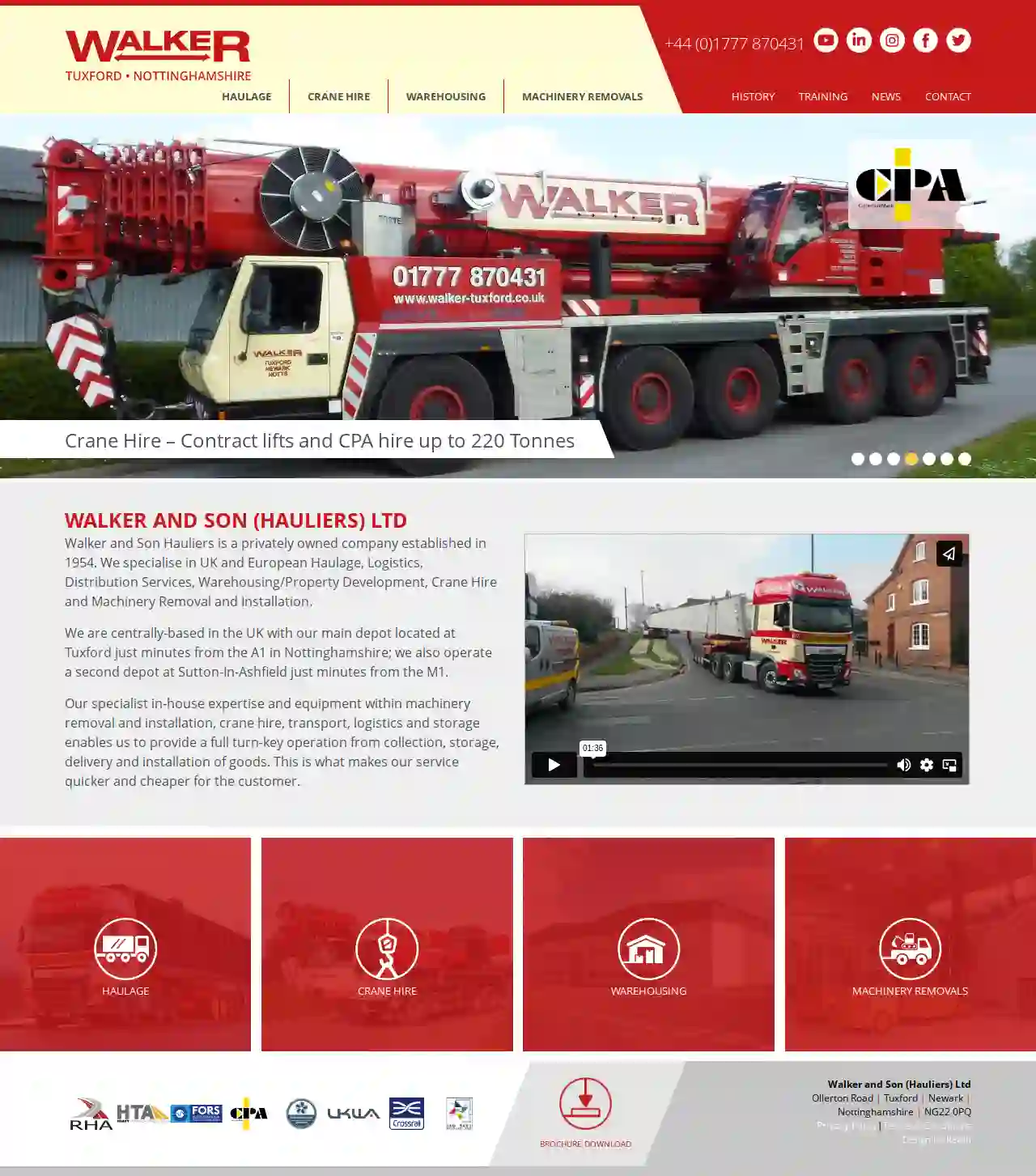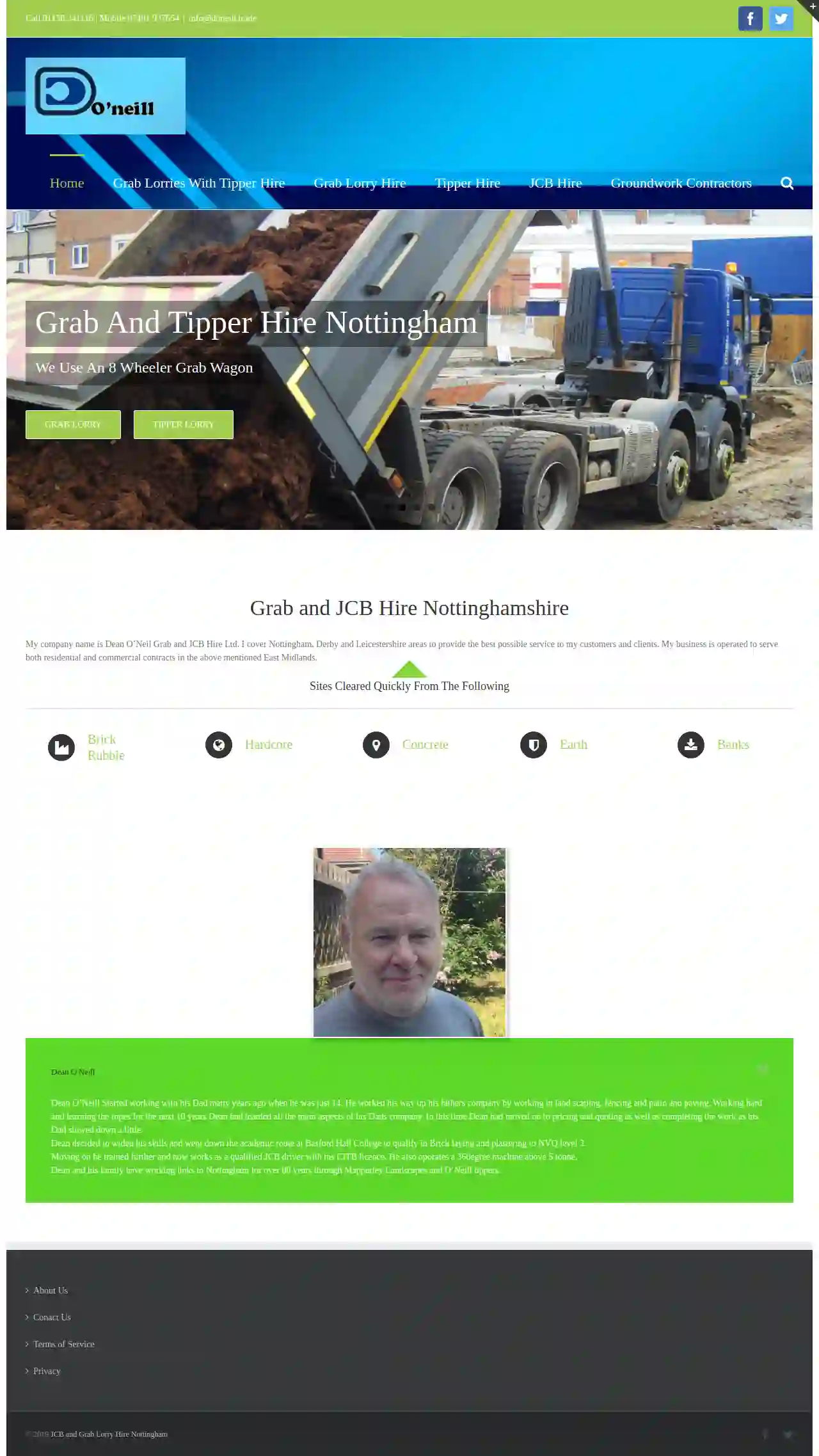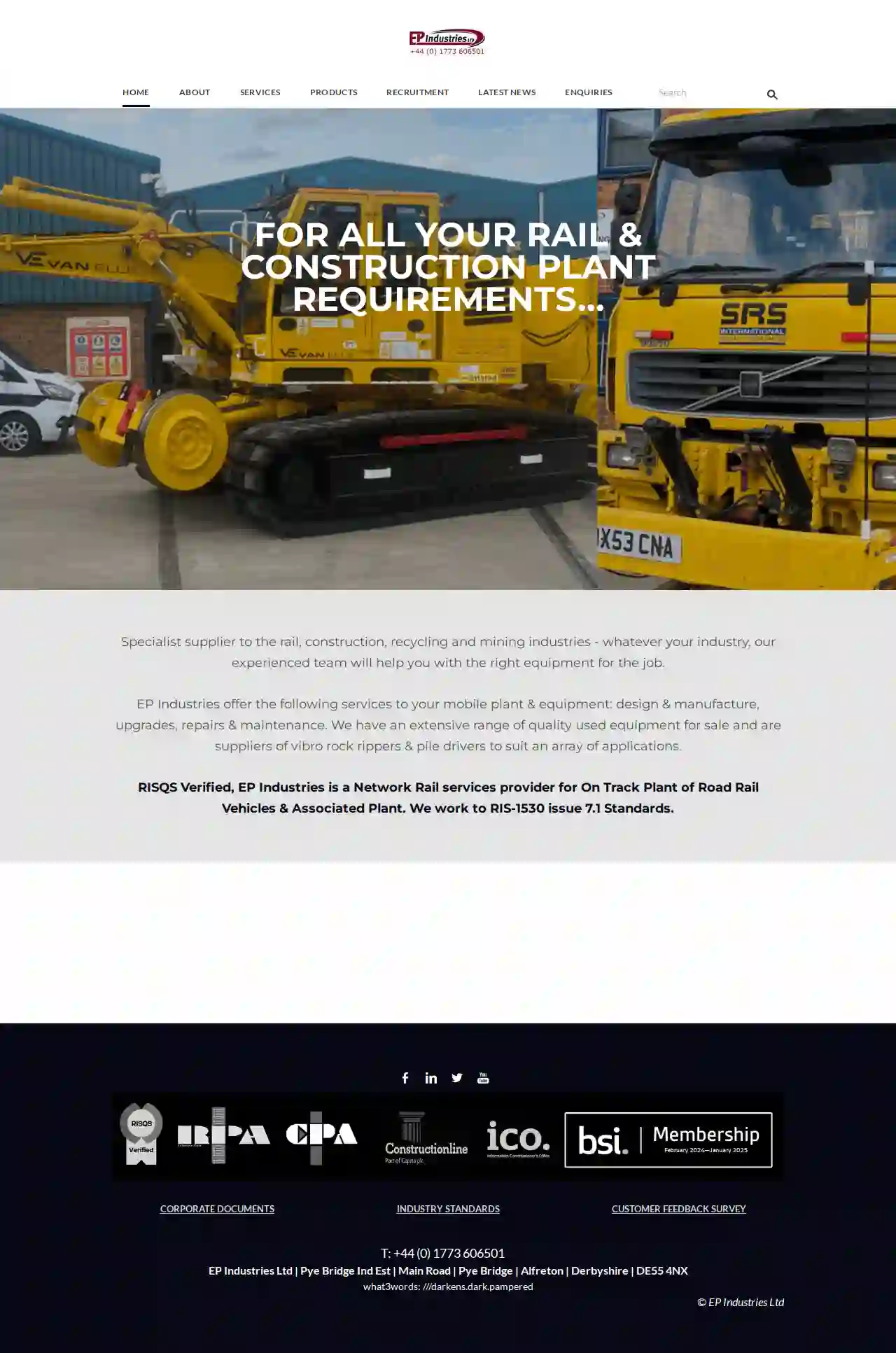Dirt Contractors Mansfield
Find Dirt Contractors in Mansfield
Get up to 3 Dirt Contractor quotes for your project today! Compare profiles, reviews, accreditations, portfolio, etc... and choose the best deal.

Walker & Son (Hauliers) Ltd
4.68 reviewsOllerton Road, Tuxford, NG22 0PQ, GBWalker and Son (Hauliers) Ltd Walker and Son Hauliers is a privately owned company established in 1954. We specialize in UK and European Haulage, Logistics, Distribution Services, Warehousing/Property Development, Crane Hire and Machinery Removal and Installation. We are centrally-based in the UK with our main depot located at Tuxford just minutes from the A1 in Nottinghamshire; we also operate a second depot at Sutton-In-Ashfield just minutes from the M1. Our specialist in-house expertise and equipment within machinery removal and installation, crane hire, transport, logistics and storage enables us to provide a full turn-key operation from collection, storage, delivery and installation of goods. This is what makes our service quicker and cheaper for the customer. Haulage Crane Hire Warehousing Machinery Removals
- Services
- Why Us?
- Gallery
Get Quote
Dean O'Neill Grab and JCB Hire - Nottingham & Mansfield
53 reviewsMansfield, GBAbout Us My company name is Dean O’Neil Grab and JCB Hire Ltd. I cover Nottingham, Derby and Leicestershire areas to provide the best possible service to my customers and clients. My business is operated to serve both residential and commercial contracts in the above mentioned East Midlands. Dean O’Neill Started working with his Dad many years ago when he was just 14. He worked his way up his fathers company by working in land scaping, fencing and patio and paving. Working hard and learning the ropes for the next 10 years Dean had learded all the main aspects of his Dads company. In this time Dean had moved on to pricing and quoting as well as completing the work as his Dad slowed down a little. Dean decided to widen his skills and went down the academic route at Basford Hall College to qualify in Brick laying and plastering to NVQ level 3. Moving on he trained further and now works as a qualified JCB driver with his CITB licence. He also oporates a 360egree machine above 5 tonne. Dean and his family have working links to Nottingham for over 80 years through Mapperley Landscapes and O’Neill tippers.
- Services
- Why Us?
- Our Team
- Gallery
Get Quote
E P Industries Ltd
3.29 reviewsPye Bridge Ind Est, Main Road, Pye Bridge Ind Est | Main Road | Pye Bridge, Alfreton, DE55 4NX, GBEP Industries: Your Trusted Partner for Rail & Construction Plant EP Industries is a leading provider of services and products to the rail, construction, recycling, and mining industries. Established in 1988 by Eddie Pilsworth, we've built a strong reputation for quality workmanship, personalized service, and quick response times. Our dedicated team has years of experience maintaining mobile plant, from single machines to large fleet operations, ensuring we can meet your needs, both nationally and internationally. Our expertise extends beyond traditional services. We've gained valuable experience operating mobile equipment in open pit, coal mining, quarrying, and other extractive industries, allowing us to offer a unique perspective and tailored solutions to mobile plant users. At EP Industries, we prioritize building long-term relationships with our customers, ensuring our services are always aligned with your specific requirements.
- Services
- Why Us?
- Gallery
Get Quote- Ma
Mansfield Excavation & Landscaping
53 reviewsMansfield, GB- Services
- Why Us?
- Gallery
Get Quote 
GEMTREE CONSTRUCTION
11 reviewsMansfield, GB- Services
- Why Us?
Get Quote
S P G Construction Ltd
4.611 reviewsMansfield, GB- Services
- Why Us?
Get Quote
Over 11,537+ Excavation Companies on our directory
Our excavation contractors operate in Mansfield & surroundings!
ExcavationHQ has curated and vetted Top Excavation Businesses arround Mansfield. Find a top & trustworthy contractor today.
Frequently Asked Questions About Dirt Contractors
- Plant Selection: Understanding your soil's pH and nutrient levels helps you choose plants that will thrive in those conditions.
- Fertilizer Recommendations: Soil tests reveal nutrient deficiencies, allowing you to apply appropriate fertilizers to meet plant needs.
- Soil Amendments: Identify soil imbalances, such as compaction or high clay content, and recommend amendments to improve soil structure and drainage.
- Construction Projects: Assess soil bearing capacity and other properties to ensure the stability and safety of foundations and other structures.
- Environmental Assessments: Detect potential soil contamination and determine the need for remediation.
- Project Scope: The size and complexity of the project, including the volume of dirt to be moved, the distance for hauling, and the type of services required.
- Dirt Type: Different dirt types have varying costs based on availability and demand. Topsoil is typically more expensive than fill dirt.
- Location: Costs may differ depending on the contractor's location and the accessibility of the project site.
- Equipment Needed: Specialized equipment, such as excavators, bulldozers, or dump trucks, can influence the overall cost.
- Labor Costs: The number of workers and their hourly rates will affect the labor portion of the cost.
- Excavators: Versatile machines with a digging arm and bucket, used for excavation, trenching, loading trucks, and demolition.
- Bulldozers: Heavy machines with a large blade at the front, used for pushing and moving dirt, clearing land, and grading.
- Skid Steers: Compact, versatile machines with various attachments, including buckets, forks, and augers, used for digging, loading, grading, and more.
- Dump Trucks: Heavy-duty trucks designed for hauling dirt, gravel, and other bulk materials. Sizes vary based on carrying capacity.
- Graders: Machines with a long blade used for precise leveling and shaping of land surfaces, often used for road construction and site preparation.
- Compactors: Equipment used to compress soil, including plate compactors, rollers, and vibratory tampers, essential for achieving soil stability.
What is a soil test, and why is it important?
How much does it cost to hire a dirt contractor?
What are some common dirt contracting equipment?
What is the difference between topsoil and fill dirt?
Topsoil: The uppermost layer of soil, characterized by its rich organic matter content, nutrients, and dark color. It's essential for supporting plant growth and is commonly used for gardening, landscaping, and lawn establishment.
Fill Dirt: Primarily composed of subsoil or excavated materials, generally lacking the organic matter and nutrients found in topsoil. It's typically less fertile and used for structural purposes, such as filling in low areas, leveling ground, or creating raised beds.
Understanding the difference between topsoil and fill dirt is crucial for choosing the appropriate soil type for your specific project needs.
What is a soil test, and why is it important?
- Plant Selection: Understanding your soil's pH and nutrient levels helps you choose plants that will thrive in those conditions.
- Fertilizer Recommendations: Soil tests reveal nutrient deficiencies, allowing you to apply appropriate fertilizers to meet plant needs.
- Soil Amendments: Identify soil imbalances, such as compaction or high clay content, and recommend amendments to improve soil structure and drainage.
- Construction Projects: Assess soil bearing capacity and other properties to ensure the stability and safety of foundations and other structures.
- Environmental Assessments: Detect potential soil contamination and determine the need for remediation.
How much does it cost to hire a dirt contractor?
- Project Scope: The size and complexity of the project, including the volume of dirt to be moved, the distance for hauling, and the type of services required.
- Dirt Type: Different dirt types have varying costs based on availability and demand. Topsoil is typically more expensive than fill dirt.
- Location: Costs may differ depending on the contractor's location and the accessibility of the project site.
- Equipment Needed: Specialized equipment, such as excavators, bulldozers, or dump trucks, can influence the overall cost.
- Labor Costs: The number of workers and their hourly rates will affect the labor portion of the cost.
What are some common dirt contracting equipment?
- Excavators: Versatile machines with a digging arm and bucket, used for excavation, trenching, loading trucks, and demolition.
- Bulldozers: Heavy machines with a large blade at the front, used for pushing and moving dirt, clearing land, and grading.
- Skid Steers: Compact, versatile machines with various attachments, including buckets, forks, and augers, used for digging, loading, grading, and more.
- Dump Trucks: Heavy-duty trucks designed for hauling dirt, gravel, and other bulk materials. Sizes vary based on carrying capacity.
- Graders: Machines with a long blade used for precise leveling and shaping of land surfaces, often used for road construction and site preparation.
- Compactors: Equipment used to compress soil, including plate compactors, rollers, and vibratory tampers, essential for achieving soil stability.
What is the difference between topsoil and fill dirt?
Topsoil: The uppermost layer of soil, characterized by its rich organic matter content, nutrients, and dark color. It's essential for supporting plant growth and is commonly used for gardening, landscaping, and lawn establishment.
Fill Dirt: Primarily composed of subsoil or excavated materials, generally lacking the organic matter and nutrients found in topsoil. It's typically less fertile and used for structural purposes, such as filling in low areas, leveling ground, or creating raised beds.
Understanding the difference between topsoil and fill dirt is crucial for choosing the appropriate soil type for your specific project needs.